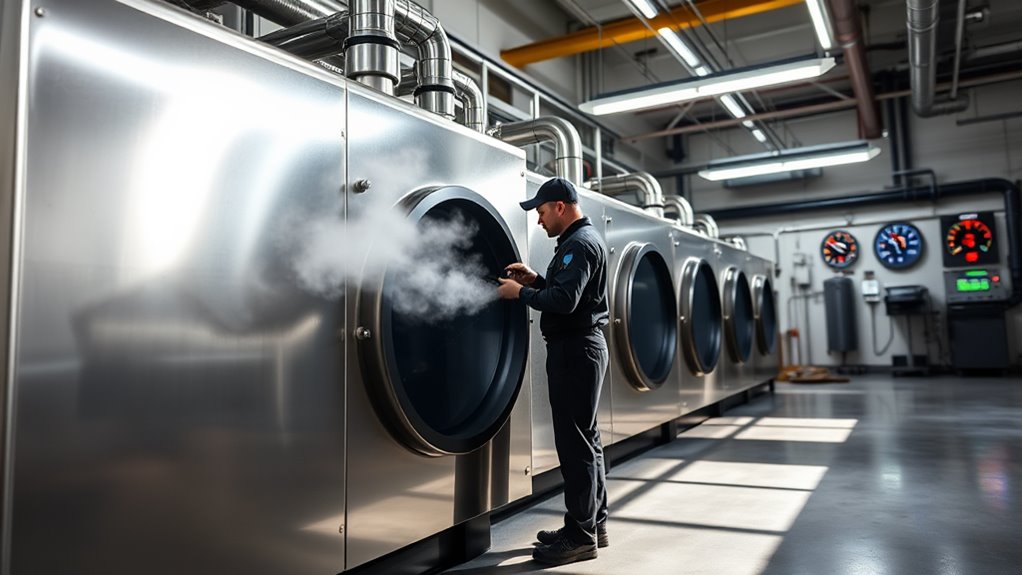You should service your commercial boiler at least every six months to guarantee peak efficiency and compliance with safety regulations. The frequency can vary based on factors like usage, boiler type, and operating environment. Regular checks help prevent costly repairs and maintain performance. Ignoring maintenance can lead to unsafe conditions and increased energy costs. To fully understand the importance and specifics of boiler maintenance, explore additional information on servicing needs and best practices.
Key insights
- Commercial boilers typically require servicing every six months, depending on usage and type.
- Regular inspections ensure optimal efficiency and compliance with safety regulations.
- High-efficiency boilers benefit from biannual servicing due to their complex components.
- Neglecting maintenance can lead to higher energy costs and costly repairs.
- Factors like operating environment and demand patterns influence servicing frequency.
Understanding Boiler Types and Their Maintenance Needs
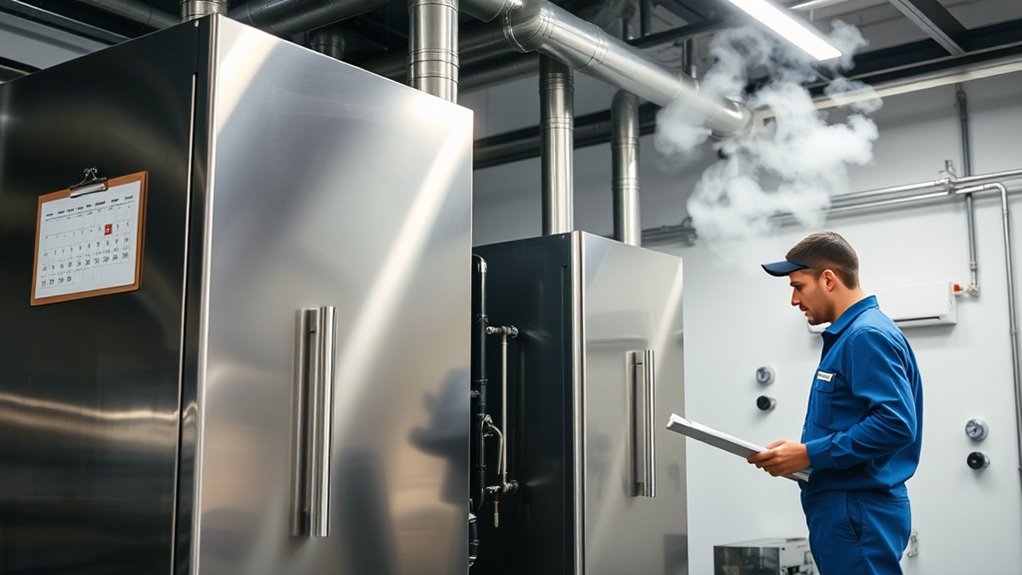
When you're managing a commercial boiler, it's crucial to understand the different types available, as each has unique maintenance requirements. For instance, fire-tube and water-tube boilers differ considerably in design and efficiency. Fire-tube boilers often require more frequent inspections to verify peak boiler efficiency, while water-tube models may need less regular attention. To streamline your maintenance efforts, develop a detailed maintenance checklist tailored to the specific boiler type. This checklist should include tasks like checking pressure gauges, inspecting combustion efficiency, and cleaning burners. By adhering to this checklist, you can enhance boiler efficiency and prolong the lifespan of your equipment. Understanding these nuances helps you maintain safe and efficient operations in your commercial facility. Additionally, regular maintenance protects investments in equipment, ensuring optimal condition for reliable performance.
Factors Influencing Boiler Servicing Frequency
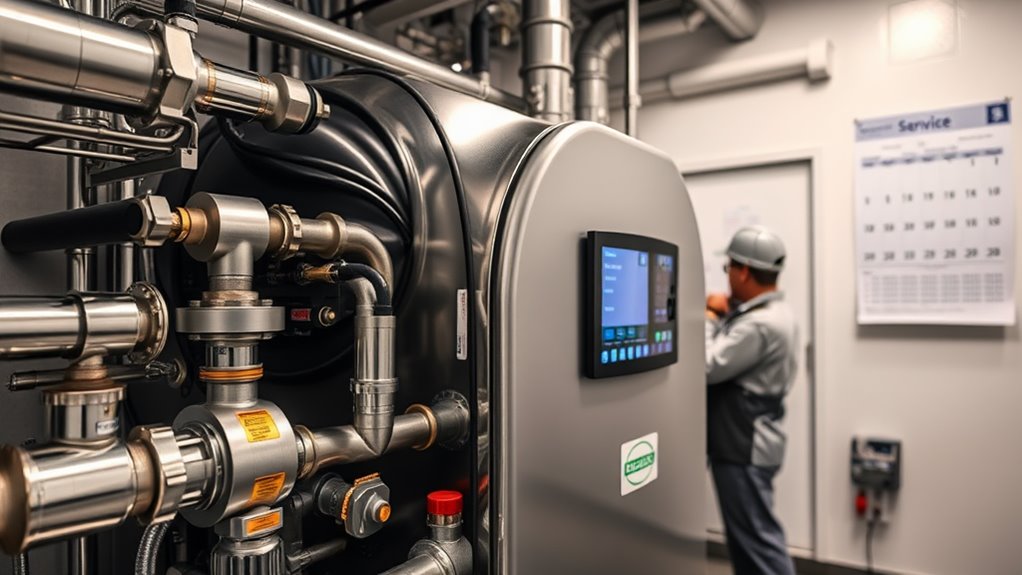
While various factors impact how often you should service your commercial boiler, understanding these elements is vital for maintaining peak performance. First, consider the boiler type and its design; some models require more frequent checks due to intricate components. Furthermore, the operating environment plays an important role; exposure to contaminants or extreme conditions can necessitate shorter service intervals. Additionally, your boiler's efficiency directly affects servicing needs; a more efficient unit typically requires less frequent maintenance. Finally, usage patterns matter; high-demand periods can increase wear and tear, warranting more regular inspections. By factoring in these elements, you can determine appropriate service intervals that guarantee maximum boiler efficiency and longevity, ultimately protecting your investment. Regular servicing ensures safe and efficient operation, reducing the risk of unexpected breakdowns and costly repairs.
Recommended Servicing Frequency for Different Boiler Types
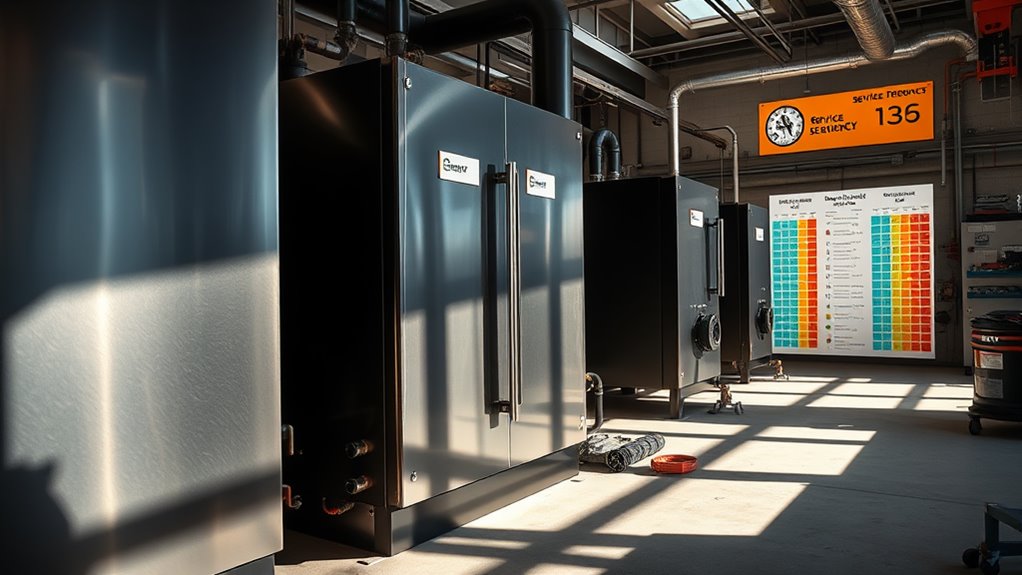
When it comes to servicing your boiler, the type of system you have plays an essential role in determining the frequency of maintenance. Residential boilers typically require annual servicing, while commercial boilers may need checks every six months, depending on usage. Industrial boilers often have specific regulatory requirements that dictate more frequent inspections, ensuring peak performance and safety. Regular maintenance is critical for peak boiler performance, as it enhances longevity and efficiency of the system.
Residential Boiler Maintenance
Regular maintenance is essential for guaranteeing the efficiency and longevity of residential boilers. By scheduling regular service, you can maximize boiler efficiency and confirm safety inspections are performed. Here are some recommended servicing frequencies based on boiler types:
- Conventional Boilers: Service once a year to check for leaks and guarantee peak performance.
- Combi Boilers: Annual maintenance is vital for efficiency and to prevent breakdowns.
- System Boilers: Schedule servicing every 12 months to maintain efficiency and safety.
- Electric Boilers: While less frequent, check every 2 years for proper functioning and safety compliance. Additionally, regular inspections can help prevent common error codes that may affect boiler performance.
Commercial Boiler Guidelines
To guarantee peak performance and compliance with safety regulations, commercial boilers require a structured maintenance schedule tailored to their specific type and usage. For standard gas-fired boilers, you should schedule annual inspections, focusing on boiler efficiency and a thorough maintenance checklist. If you operate a high-efficiency boiler, consider biannual servicing to address more complex components and secure peak performance. Steam boilers, due to their intricate systems, benefit from quarterly inspections to monitor pressure levels and safety devices. Additionally, for boilers used in high-demand applications, monthly checks can prevent costly downtimes. Regular adherence to these guidelines not only enhances boiler efficiency but also prolongs the lifespan of your equipment, guaranteeing a reliable heating solution for your business. Implementing a routine maintenance plan is essential for ensuring compliance with safety regulations, ultimately safeguarding your business operations.
Industrial Boiler Requirements
Understanding the specific servicing needs of industrial boilers is essential for maintaining operational efficiency and safety. Different boiler types require tailored servicing frequency based on their boiler capacity and energy efficiency. Here are some recommended guidelines:
- High-capacity boilers (over 1,000,000 BTU): Service at least every 6 months to guarantee peak performance.
- Medium-capacity boilers (500,000-1,000,000 BTU): Schedule servicing annually to maintain energy efficiency.
- Low-capacity boilers (under 500,000 BTU): Regular checks every 1-2 years can suffice, but monitor closely.
- Steam boilers: Inspect quarterly to prevent safety hazards and boost energy efficiency.
Additionally, routine maintenance is essential for ensuring long-term operational efficiency and preventing costly repairs.
The Importance of Regular Boiler Maintenance
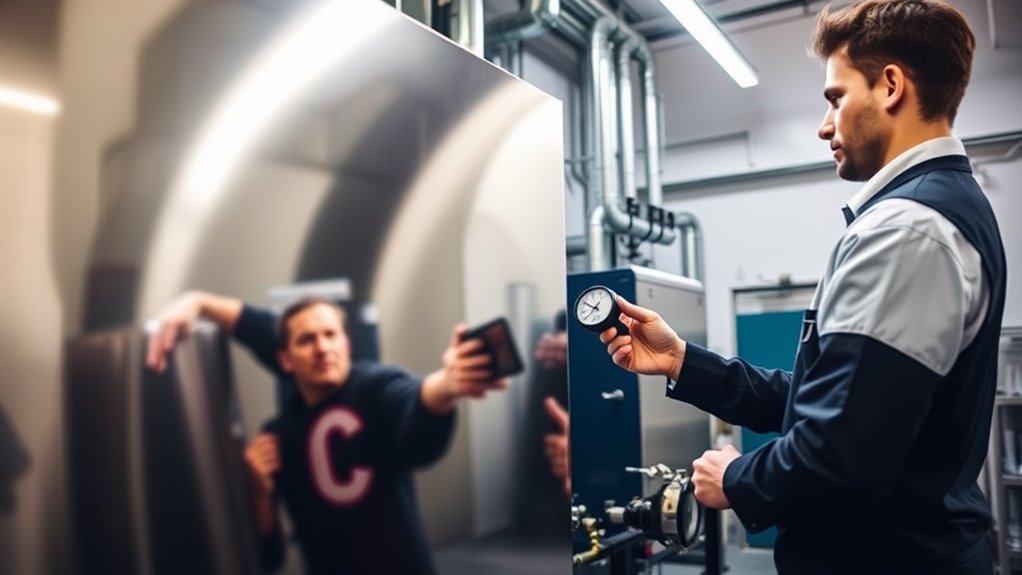
While it might be easy to overlook, the maintenance of a commercial boiler is essential for guaranteeing ideal performance and safety. Regular servicing helps maintain boiler efficiency, preventing energy waste and reducing operational costs. By adhering to safety regulations, you minimize the risk of hazardous failures that can lead to serious accidents. Routine checks, including inspecting pressure levels, testing safety valves, and cleaning components, guarantee your boiler operates within safe parameters. Neglecting maintenance can result in decreased efficiency, higher energy bills, and potential legal issues due to non-compliance with safety standards. Prioritizing regular boiler maintenance not only extends the lifespan of your equipment but also safeguards your facility and employees, guaranteeing a reliable heating system when you need it most. Additionally, monitoring pressure gauge levels can help prevent issues such as the E119 error code from occurring.
Signs Your Commercial Boiler Needs Immediate Attention
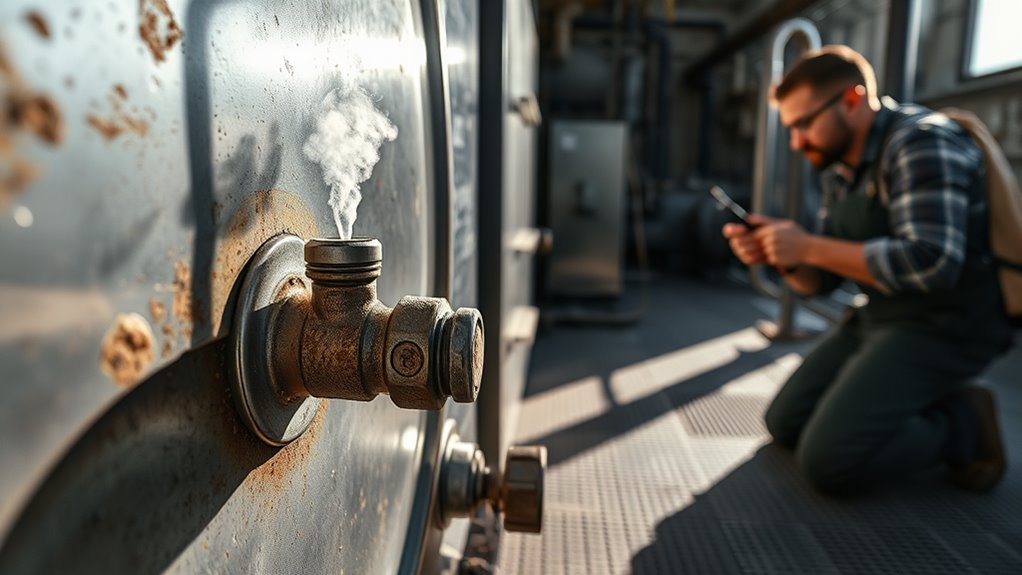
Recognizing the signs that your commercial boiler needs immediate attention is essential for maintaining operational efficiency and safety. Ignoring these indicators can lead to costly repairs or unsafe conditions. Here are four critical signs to watch for:
- Boiler Leaks: If you notice pooling water around the boiler, it's a clear sign of a leak that requires urgent repair.
- Unusual Noises: Sounds like banging, hissing, or gurgling may indicate internal issues, such as sediment buildup or component failure.
- Fluctuating Pressure: Erratic pressure readings can signal underlying problems that need professional assessment.
- Unresponsive Controls: If your boiler's control system fails to respond, it may be time for immediate troubleshooting.
Additionally, a failure to ignite, resulting in an Ea error code, can indicate that your boiler requires immediate service to restore functionality. Addressing these issues promptly can prevent further complications.
Local Regulations and Compliance for Boiler Servicing
Understanding local regulations for boiler servicing is vital for maintaining compliance and ensuring safety. You'll need to familiarize yourself with the specific legal requirements that apply to your area, as these can vary greatly. Regular compliance checks are not only mandatory but also essential for the efficient operation of your boiler system. Additionally, obtaining a Commercial Gas Safety Certificate can help validate your compliance with safety standards and regulations.
Legal Requirements Overview
When operating a commercial boiler, it's important to stay informed about the local legal requirements governing its servicing. Understanding your legal obligations guarantees compliance with regulatory standards and maintains safety in your facility. Here are four key points to take into account:
- Regular Inspections: Many jurisdictions mandate annual inspections to verify boiler safety and efficiency.
- Qualified Personnel: Only certified technicians should perform servicing to meet legal obligations.
- Documentation: Keep accurate records of all maintenance and service activities to demonstrate compliance during inspections.
- Safety Standards: Familiarize yourself with local safety codes to make sure all servicing aligns with regulatory standards. Additionally, proactive maintenance can minimize potential problems and ensure the boiler operates efficiently.
Compliance Check Frequency
To guarantee compliance with local regulations, it's vital to establish a clear schedule for compliance checks on your commercial boiler. Depending on your location, compliance regulations may dictate that you conduct inspections annually or biannually. Regular checks not only promote safety but also keep you aligned with legal standards.
Documenting each servicing event is essential; maintain accurate servicing documentation that details inspections, repairs, and any compliance-related adjustments. This documentation serves as proof of adherence during audits and can protect you from potential fines. Always consult local authorities or a licensed technician to confirm the specific compliance check frequency required in your area. Keeping your boiler compliant promotes operational efficiency and safety for everyone involved.
Benefits of Proactive Boiler Maintenance
Proactive boiler maintenance offers significant advantages that extend beyond mere compliance with safety regulations. By prioritizing regular upkeep, you can enhance boiler efficiency and achieve substantial cost savings. Here are four key benefits:
- Improved Efficiency: Regular maintenance optimizes performance, ensuring your boiler operates at peak efficiency, reducing energy consumption.
- Extended Lifespan: Routine checks help identify potential issues before they escalate, prolonging the life of your boiler and delaying costly replacements.
- Reduced Downtime: Proactive care minimizes unexpected breakdowns, ensuring your operations run smoothly without interruptions.
- Enhanced Safety: Regular inspections help to identify safety hazards, ensuring a safer environment for all employees and compliance with regulations.
How to Choose a Reliable Boiler Service Provider
Selecting a reliable boiler service provider is essential for maintaining the efficiency and safety of your commercial boiler. Start by researching companies with proven experience in boiler service; check their certifications and licenses to verify compliance with industry standards. Reliability factors to take into account include customer reviews, response times, and warranty offerings. Request references to gauge past performance and satisfaction levels. Additionally, inquire about their maintenance protocols and whether they offer emergency services. A good provider should be transparent about pricing and services offered, making sure you understand what you're paying for. Ultimately, choose a provider that demonstrates a commitment to quality and customer service, as this will guarantee your boiler operates safely and efficiently for years to come.
Cost Implications of Neglecting Boiler Servicing
Neglecting regular boiler servicing can lead to considerable financial repercussions for your business. The cost consequences of maintenance neglect can accumulate quickly, affecting your bottom line in various ways:
- Increased Energy Bills: An inefficient boiler consumes more fuel, resulting in higher operational costs.
- Repair Expenses: Minor issues can escalate into major repairs if not addressed promptly, leading to costly downtime.
- Shortened Lifespan: Lack of maintenance can considerably reduce the boiler's operational life, necessitating an expensive replacement sooner than expected.
- Regulatory Fines: Failing to comply with safety regulations might incur penalties, further straining your finances.
Preparing for Your Commercial Boiler Service Appointment
To guarantee a smooth service appointment for your commercial boiler, schedule regular maintenance well in advance. Gather all necessary documentation, including service records and warranty information, to provide your technician with a complete overview. This preparation not only facilitates an efficient service but also helps identify potential issues early.
Schedule Regular Maintenance
When you prioritize regular maintenance for your commercial boiler, you're taking an essential step toward ensuring its efficiency and longevity. Scheduling service appointments at consistent intervals is vital to uphold boiler performance. Follow these boiler maintenance best practices to maximize your system's reliability:
- Set a Maintenance Schedule: Choose a regular time, ideally before peak usage seasons, for appointments.
- Inspect Components: Regularly check essential parts like burners, heat exchangers, and pumps for wear.
- Monitor Performance: Keep track of any fluctuations in temperature or pressure, and report them to your technician.
- Document Service History: Maintain a detailed record of all service appointments, repairs, and parts replaced.
Gather Necessary Documentation
Gathering the necessary documentation before your commercial boiler service appointment can greatly streamline the process and enhance the efficiency of the technician's work. Start by compiling essential documentation types, including your boiler's user manual and warranty information. These documents provide significant specifications and coverage details. Next, gather your service records, which should include previous maintenance schedules, repairs, and any issues encountered. This history allows the technician to diagnose potential problems more effectively. Additionally, if you've made any modifications or upgrades to the boiler, document these changes as well. Having this information readily available not only saves time but also guarantees the technician can perform a thorough and accurate service, ultimately prolonging your boiler's lifespan and efficiency.
Frequently Asked Questions
Can I Perform My Own Boiler Maintenance Checks?
You can perform your own boiler maintenance checks, but it's crucial to know what you're doing. Regular DIY checks include inspecting the pressure gauge, checking for leaks, and verifying safety valves function properly. You should also clean the boiler's exterior and check the flue for blockages. However, for more complex issues or in-depth servicing, it's best to consult a professional to guarantee safety and compliance with regulations. Always prioritize safety in your maintenance efforts.
What Qualifications Should My Boiler Technician Have?
When hiring a boiler technician, you should look for specific qualifications. Verify they possess recognized boiler technician certifications, indicating they've undergone proper training. Additionally, inquire about their boiler service experience; hands-on knowledge is essential for effective maintenance and repairs. A qualified technician will understand various boiler types and be familiar with safety regulations, guaranteeing compliance and peak performance. Don't compromise on these qualifications to assure the reliability of your system.
How Long Does a Typical Boiler Service Take?
A typical boiler service duration ranges from one to two hours, depending on the boiler's complexity and its maintenance schedule. During this time, your technician will inspect components, clean parts, and guarantee proper functioning. If your boiler has specific issues or requires extensive repairs, the service may take longer. Regular servicing not only keeps your system efficient but also helps prevent costly breakdowns in the future, enhancing its longevity and reliability.
What Should I Do if My Boiler Breaks Down?
If your boiler breaks down, start with boiler troubleshooting tips. Check the power supply, verify the thermostat's set correctly, and look for error codes on the display. If those steps don't help, you'll need to explore emergency repair options. Contact a certified technician immediately to assess and fix the issue. Don't attempt major repairs yourself, as this could void warranties or worsen the problem. Prioritize safety and get professional assistance.
Are There Warranties Related to Regular Boiler Servicing?
Yes, boiler warranties often require regular servicing to remain valid. By keeping up with maintenance, you not only comply with warranty terms but also enjoy several servicing benefits, such as improved efficiency and reduced risk of breakdowns. It's vital to document each service, as this can be significant if you ever need to make a warranty claim. Always check your warranty details to guarantee you're meeting all necessary conditions.
Summary
In summary, prioritizing regular servicing of your commercial boiler is vital for peak performance and safety. Depending on the type of boiler, you'll need to schedule maintenance annually or biannually. By staying proactive, you not only extend the lifespan of your equipment but also prevent costly breakdowns and guarantee compliance with regulations. Don't overlook the signs of potential issues; addressing them early can save you time and money. Choose a reliable service provider to keep your boiler running efficiently.

